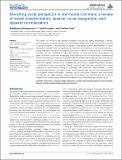Revisiting vocal perception in non-human animals : a review of vowel discrimination, speaker voice recognition, and speaker normalization
Abstract
The extent to which human speech perception evolved by taking advantage of predispositions and pre-existing features of vertebrate auditory and cognitive systems remains a central question in the evolution of speech. This paper reviews asymmetries in vowel perception, speaker voice recognition, and speaker normalization in non-human animals topics that have not been thoroughly discussed in relation to the abilities of non-human animals, but are nonetheless important aspects of vocal perception. Throughout this paper we demonstrate that addressing these issues in non-human animals is relevant and worthwhile because many non-human animals must deal with similar issues in their natural environment. That is, they must also discriminate between similar-sounding vocalizations, determine signaler identity from vocalizations, and resolve signaler-dependent variation in vocalizations from conspecifics. Overall, we find that, although plausible, the current evidence is insufficiently strong to conclude that directional asymmetries in vowel perception are specific to humans, or that non-human animals can use voice characteristics to recognize human individuals. However, we do find some indication that non-human animals can normalize speaker differences. Accordingly, we identify avenues for future research that would greatly improve and advance our understanding of these topics.
Citation
Kriengwatana , B , Escudero , P & ten Cate , C 2015 , ' Revisiting vocal perception in non-human animals : a review of vowel discrimination, speaker voice recognition, and speaker normalization ' , Frontiers in Psychology , vol. 5 , 1543 . https://doi.org/10.3389/fpsyg.2014.01543
Publication
Frontiers in Psychology
Status
Peer reviewed
ISSN
1664-1078Type
Journal item
Collections
Items in the St Andrews Research Repository are protected by copyright, with all rights reserved, unless otherwise indicated.

